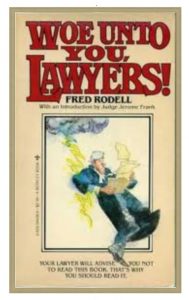No lawyer will like this book. It isn’t written for lawyers. It is written for the average man and its purpose is to try to plant in his head, at the least, a seed of skepticism about the whole legal profession, its works and its ways.
In case anyone should be interested, I got my own skepticism early. Before I ever studied law I used to argue occasionally with lawyers – a foolish thing to do at any time. When, as frequently happened, they couldn’t explain their legal points so that they made any sense to me I brashly began to suspect that maybe they didn’t make any sense at all. But I couldn’t know. One of the reasons I went to law school was to try to find out.
At law school I was lucky. Ten of the men under whom I took courses were sufficiently skeptical and common-sensible about the branches of law they were teaching so that, unwittingly of course, they served together to fortify my hunch about the phoniness of the whole legal process. In a sense, they are the intellectual godfathers of this book. And though all of them would doubtless strenuously disown their godchild, I think I owe it to them to name them. Listed alphabetically, they are:
Thurman Arnold, now Assistant Attorney-General of the United States;
Charles E. Clark, now Judge of the U.S. Circuit Court of Appeals;
William O. Douglas, now Justice of the U.S. Supreme Court;
Felix Frankfurter, now Justice of the U.S. Supreme Court;
Leon Green, now Dean of the Northwestern University Law School;
Walton Hamilton, Professor of Law at Yale University;
Harold Laski, Professor of Political Science at the London School of Economics;
Richard Joyce Smith, now a practicing attorney in New York City;
Wesley Sturges, now Director of the Distilled Spirits Institute;
and the late Lee Tulin.
